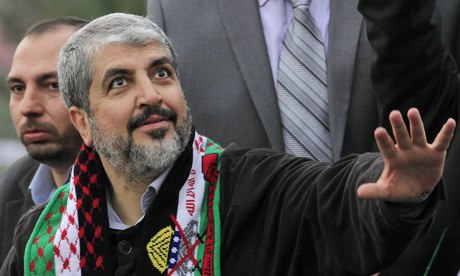
Khaled Meshaal, the head of Hamas’s political bureau, may visit Tehran in the coming months. Photograph: Mohammed Saber/EPA
"A rapprochement between Hamas and Tehran is under way almost three years after a breach over the Palestinian party's refusal to back the Syrian government in the civil war, and amid its current political isolation following the demise of the Muslim Brotherhood in Egypt.
The rebuilding of the relationship is likely to dismay Israel and the US, which had welcomed the weakened ties between Gaza's rulers and their powerful political, financial and military sponsors.
"Relations between us are now almost back to how they were before [the crisis over Syria]. We believe we will soon be back at that point," said Taher al-Nounou, an aide to Gaza's prime minister, Ismail Haniyeh. Contacts between high-ranking officials from both sides had resumed, he said.
Khaled Meshaal, the head of Hamas's political bureau, based in Qatar, has met Iranian representatives in Ankara and Doha in recent months, and may visit Tehran in the coming months.
According to Nounou, a delegation of Hamas officials based outside Gaza visited Tehran two months ago. Hamas leaders inside Gaza have been unable to leave the blockaded coastal strip since the military coup in Egypt last July.
Another senior Hamas official, Bassem Naim, confirmed the renewed contacts between his organisation and Tehran. "Ties had never been conclusively severed, but recently there have been a number of meetings that brought new blood back into our relationship with Iran," he said.
"There were several visits and meetings, as there had been previously. But this time the meetings were held at a high level on the part of Hamas and Iran. This led to a marked improvement and progression in the relationship."
The alliance was severely damaged by the stance Hamas took when the uprising against Bashar al-Assad began in Syria almost three years ago. Although the exiled Hamas leadership had been hosted by Assad's regime in Damascus for a decade, it refused to back the government against the rebels, incurring the wrath of Syria's allies, Tehran. Meshaal and other members of the external Hamas leadership left Syria the following year, in 2012.
Iranian leaders cut off funding to Hamas, which had been worth around $23m (£14m) a month, causing a serious financial crisis for Gaza's rulers. This has been severely exacerbated in the past six months by theclosure of the smuggling tunnels between Gaza and Egypt by the new regime in Cairo.
The removal of former the Egyptian president Mohamed Morsi and the bloody crackdown on the Muslim Brotherhood, Hamas's ideological parent organisation, has left the Palestinian Islamist party politically and psychologically isolated. "Hamas's big dream of political Islam coming to power has vanished," said the Gaza analyst Omar Shaban.
According to Nounou, who described Hamas-Iran relations as "a very sensitive issue", the ties between the two were weakened by the war in Syria, but not severed. "We kept some channels open," he said. "Recently Iran realised that Hamas was not against Iran or the Syrian regime. They understood that we wanted to be neutral. It was a misunderstanding."
[What an unprincipled position by Hamas. But being starved and besieged works wonders!]
Asked if Tehran had resumed its financial support, Nounou said: "We don't announce these things because there would be efforts to stop it."
Since the closure of the tunnels, Hamas has faced logistical difficulties in bringing financial aid to Gaza. Suitcases filled with cash were transported through the tunnels before the Egyptian crackdown.
Mahmoud al-Zahar, a hardline Hamas leader in Gaza, declined to comment on whether Tehran had resumed its provision of cash or weapons, saying: "It is difficult to discuss secret things. It will only serve the Israelis".
Zahar, who visited Tehran last year, said he was in constant contact with the Iranians, and that any reconciliation between Tehran and the west over the nuclear issue would not affect its support for Hamas.
The rapprochement was not connected to events in Egypt, he insisted. "Hamas is not politically isolated. Do not exaggerate the difficulties with Egypt. The Muslim Brotherhood is not finished," he said."
Additional reporting by Hazem Balousha

No comments:
Post a Comment